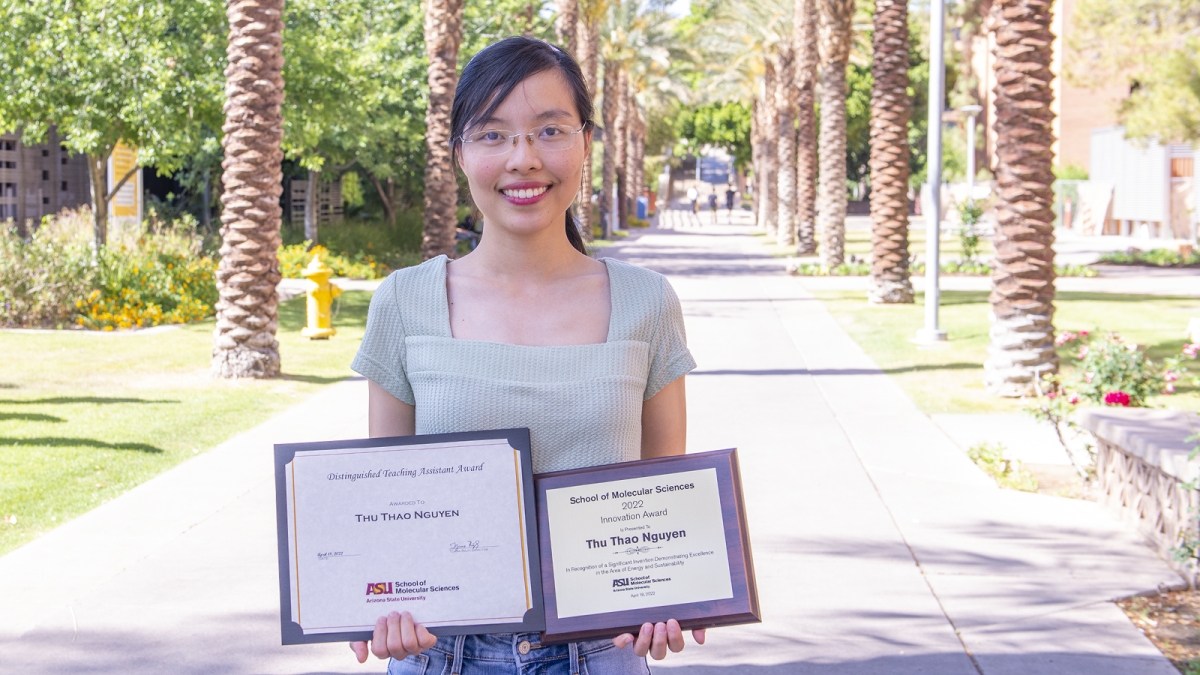ASU grad student wins Innovation Award for sustainable semiconductor coating process

Thu Thao Nguyen, recipient of the 2022 School of Molecular Sciences Innovation Award.
Thu Thao Nguyen, an Arizona State University PhD student working with School of Molecular Sciences Associate Professor Ryan Trovitch, has developed a catalyst that provides a sustainable and efficient method to produce semiconductor coatings.
Because semiconductors are used in a wide range of electronics, her manganese-based catalyst has not only earned her the Innovation Award from the School of Molecular Sciences, but it has also garnered interest from government agencies and manufacturing corporations.
“Few chemists are able to redefine the applications of a reaction while immediately gaining the attention of government agencies and corporate partners,” Trovitch said. “Thao has been able to do just that. Her development of an earth-abundant metal catalyst for the synthesis of chemical vapor deposition precursors represents a significant improvement over current methods that rely on corrosive chlorosilanes and offers the world a sustainable route to semiconductor coatings, which can positively impact microelectronics and solar panel manufacturing.”
The award, which is supported through the ASU Foundation, is given annually to a graduate student for excellence in achieving the School of Molecular Sciences' mission of discovering molecular-level solutions to real-world challenges through the pursuit of methodology or development of research ideas or inventions.
“(The school) continues to be extremely grateful to Emeritus Professor William Glaunsinger and Lorna Glaunsinger for their continued support of this award, which provides our students with a unique opportunity and represents a concrete demonstration of support of the principle 'advancing research and discovery of public value' as given in the ASU Charter,” said Tijana Rajh, director of the School of Molecular Sciences.
Nguyen, in her fourth year of her PhD program, is grateful for receiving the Innovation Award, as well as the opportunities she has at ASU.
Born and raised in Hanoi, Vietnam, by her mother, Nguyen credits her mom for nurturing her curiosity and tenacity.
“My dad passed away when I was only 1 year old,” Nguyen said, “so my mother had to work really hard to make a living. We were very poor, but she never refused whenever I said that I wanted to learn something. She always encourages me to try my best and do what I want. Seeing how hard she works and all the difficulties she has been through motivates me to tackle any challenge and not to give up.
“Receiving the 2022 SMS Innovation Award lightens part of my financial burden and motivates me to focus more on research and the pursuit of my career as a chemist."
Nguyen earned her bachelor's degree in chemistry from the Hanoi University of Education, then worked as a high school teacher prior to starting her graduate degree at ASU in 2018.
“I like the fact that ASU supports and encourages graduate students to do science independently and utilize the facilities needed for our research,” Nguyen said. “The staff are super kind and are always willing to help us.”
Nguyen and Trovitch are currently working with ASU Skysong Innovations on the commercialization of her catalyst, which has been recently patented, and further study funded by a grant from the National Science Foundation.
“Thao has already synthesized several grams of her catalyst for industrial screening,” Trovitch said, “and her efforts are directly responsible for a National Science Foundation award that our group recently received. I was thrilled to hear that Thao was named the recipient of this year’s School of Molecular Sciences Innovation Award. She absolutely deserves it!”
“I think innovation is critical, especially in this time when we are facing many challenges in a wide range of fields, from new diseases to the hurdles of sustainable energy and environmental problems," Nguyen said. "Doing research is difficult; receiving this award encourages me to pursue my career as a scientist and find sustainable solutions that benefit the world.”
More Science and technology

4 ASU researchers named senior members of the National Academy of Inventors
The National Academy of Inventors recently named four Arizona State University researchers as senior members to the prestigious…

Transforming Arizona’s highways for a smoother drive
Imagine you’re driving down a smooth stretch of road. Your tires have firm traction. There are no potholes you need to swerve to…

The Sun Devil who revolutionized kitty litter
If you have a cat, there’s a good chance you’re benefiting from the work of an Arizona State University alumna. In honor of…

